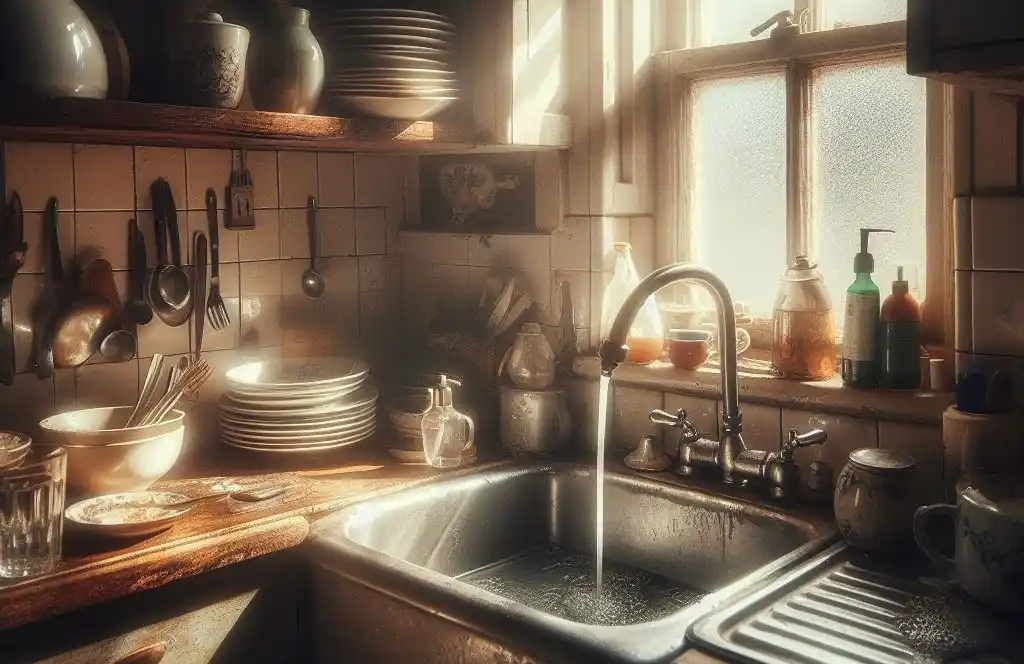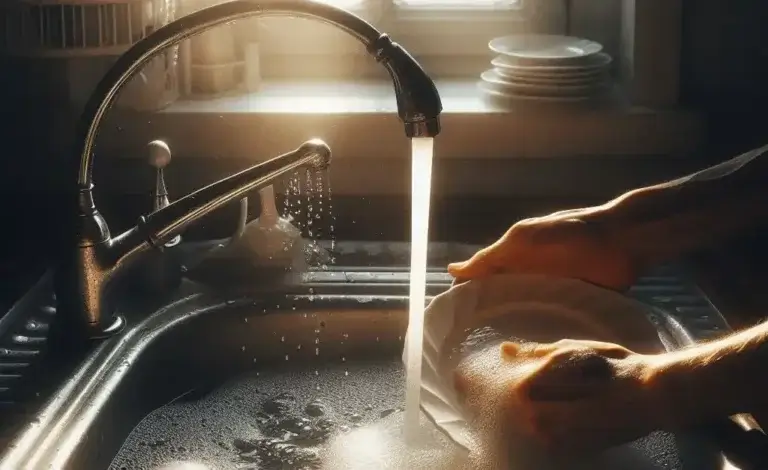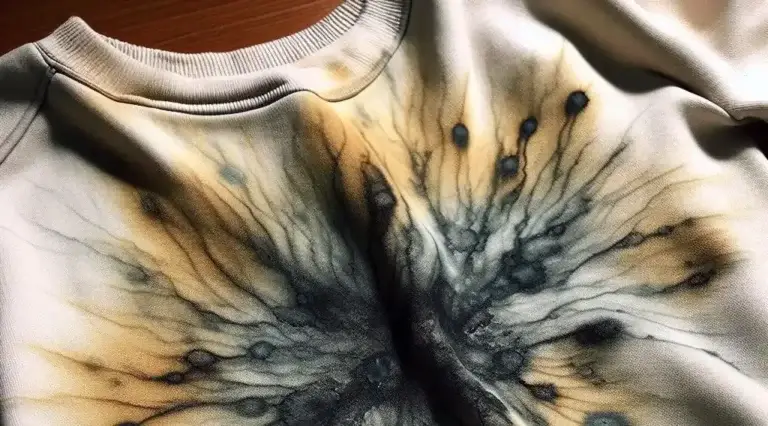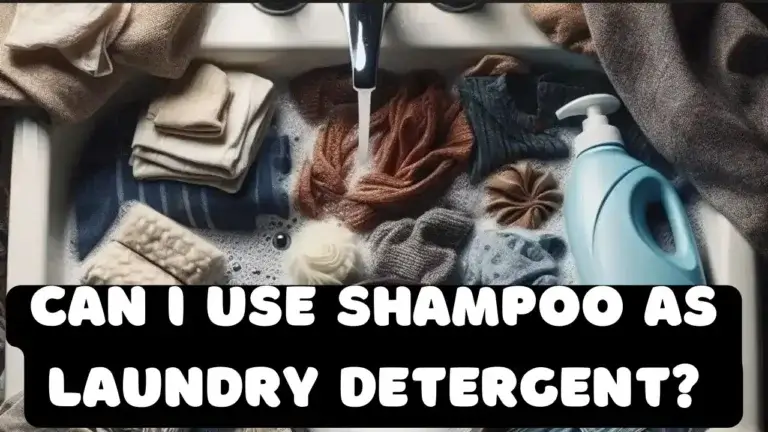Can I Wash Dishes With Laundry Detergent? Experts Options to Use Laundry Detergent to Wash Dishes
Have you ever been tempted to use laundry detergent to wash your dirty dishes? Perhaps you’ve run out of dish soap and are wondering if you can use laundry detergents instead. Or maybe you’re simply curious if regular laundry soap can effectively wash away grease and food particles from your plates and utensils.
Washing dishes is a daily chore in most households. While dish soap is specially formulated for cleaning dishes, laundry detergents are made for washing clothes in a machine. So what happens if you use laundry detergent to hand wash your dishes?
In this comprehensive guide, can i wash dishes with laundry detergent, including:
- Can You Use Laundry Detergent to Wash Dishes?
- Differences Between Laundry Detergent and Dish Soap
- Is It Safe to Use Laundry Detergent on Dishes?
- Will Laundry Detergent Clean Dishes Effectively?
- Environmentally-Friendly Laundry Detergent Alternatives
- Tips for Handwashing Dishes
- Homemade Dish Soap Recipes
Let’s weigh in on whether laundry detergent can be used for washing dishes!
Table of Contents
Can You Use Laundry Detergent to Wash Dishes?
Laundry detergents can technically be used to wash dishes. However, there are a few important things to consider before using your regular Tide or Gain to scrub plates and glasses.
The main question is whether laundry detergent is as effective and safe on dishes as standard dish soaps. While homemade mixtures of baking soda and detergent can work decently well, many experts advise against relying solely on laundry detergent for dish cleaning due to the differences in formulas.
Differences Between Laundry Detergent and Dish Soap
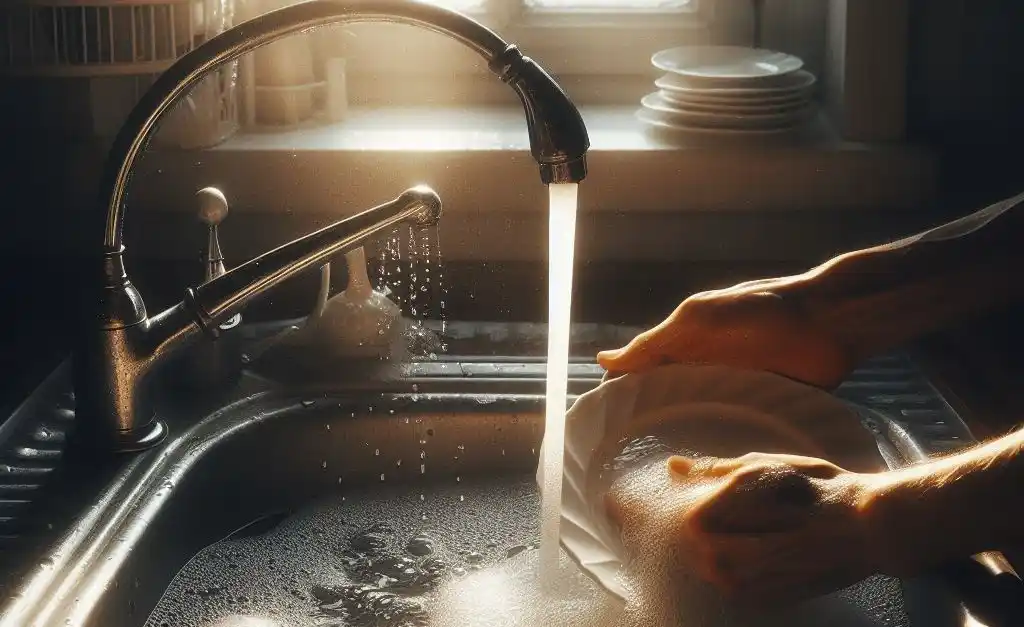
Laundry detergents and dish soaps are designed with different ingredients and purposes in mind:
Laundry Detergent
- Formulated to wash clothes
- Contains enzymes to breakdown stains
- Includes brighteners and whitening agents
- More concentrated/harsh surfactants
- Sometimes has bleach and fragrance
Dish Soap
- Specialized for washing dishes/cookware
- High grease-cutting surfactants
- Mild cleansers won’t harm skin
- Rinses cleanly off dishes
- No whitening agents or brighteners
As you can see, the chemical makeup between the two cleaning products varies quite a bit. While laundry detergents are powerful on stains, the formulas are not optimized for dishes and can leave unwanted residue.
Dish soap, on the other hand, is specially engineered to cut through grease, lift food particles, and rinse freely off plates and cutlery. The milder formula also won’t negatively affect your skin.
Is It Safe to Use Laundry Detergent on Dishes?
Most experts advise against relying on laundry detergent alone to wash dishes, for a few safety reasons:
- Skin Irritation: Laundry detergent may contain skin-irritating chemicals not found in mild dish soaps. This poses an increased risk of irritation for hands and ingestion from plate residues.
- Harmful Ingestion: Accidentally consuming laundry detergent residue from dishes can cause vomiting, hospitalization, or even death in some cases. Always rinse thoroughly.
- Toxic Fumes: Some laundry detergents give off dangerous fumes, especially when mixed with water and heated. This poses added concerns of inhaling toxic gases during dishwashing.
- Residue Buildup: Laundry detergent may not fully rinse off plates and cups, allowing chemicals and whitening agents to build up over repeated use.
So while you likely won’t get sick from washing dishes with Tide once in a while, it’s generally not considered a safe long-term solution for everyday dishwashing. Play it safe and use a mild dish soap instead!
Will Laundry Detergent Clean Dishes Effectively?
For most people, laundry detergent proves noticeably less effective at cleaning dishes than standard dish soap. Here’s why:
- Fewer Suds: Laundry detergent often doesn’t produce as many suds and bubbles, which help lift and remove grime from dish surfaces. Turn to dish soap for extra foaming power.
- Grease Issues: Laundry detergent is not specially formulated to cut grease. Since many cooked-on food residues contain oils and fats, laundry detergent may prove inadequate at removing these stubborn messes.
- Spotty Rinsing: The ingredients within laundry detergent can leave unappealing spots, film, and blueish residues on glassware and dishes unless thoroughly rinsed. Dish soap rinses cleaner.
- Water Spotting: Some laundry detergents contribute to water spotting on dishes as they air dry. Dish soap is optimized to sheet water off to minimize water marks.
While laundry detergent will lift some decent food debris in a pinch, rely on standard dish soap for superior grease-fighting action and easier rinseability. Don’t expect squeaky clean dishes from laundry detergent alone!
Environmentally-Friendly Laundry Detergent Alternatives For Dishwashing
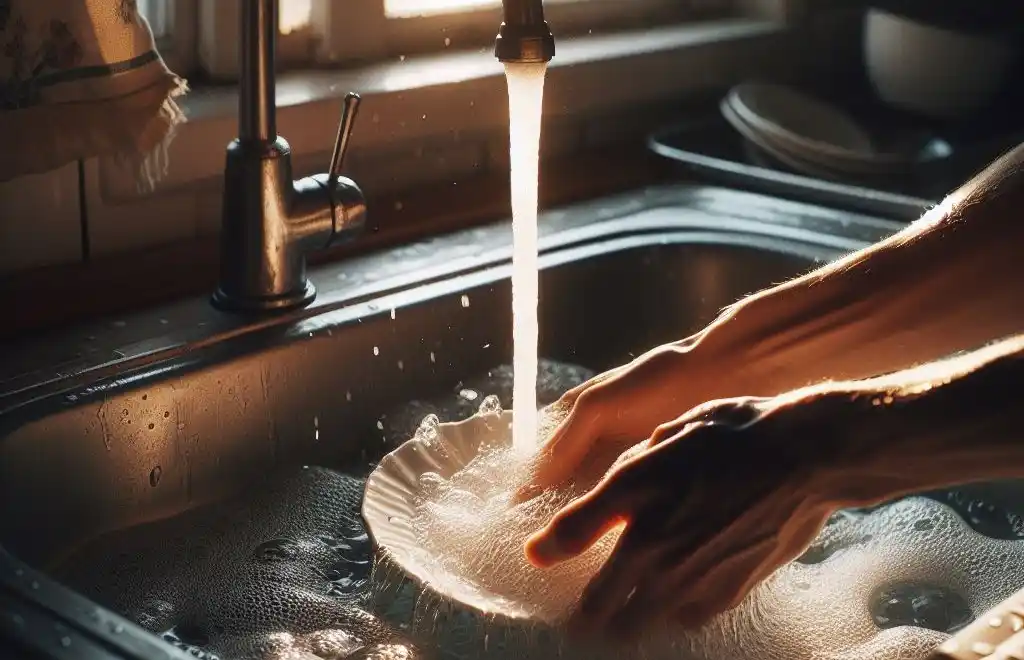
If you’re eco-conscious and want to avoid chemicals, try these all-natural liquid laundry detergents that can work for handwashing light loads of dishes:
- Seventh Generation Laundry Detergent – Non-toxic and biodegradable detergent derived from plants. Also available in single-use packs.
- Ecos Laundry Detergent – 100% plant-based detergent pellets with vegetable soap to effectively combat grease and oils.
- Molly’s Suds Laundry Detergent – Cleans effectively with natural enzymes and essential oils. No synthetic chemicals.
- Dropps Laundry Detergent – Dissolvable laundry detergent pods made with plant-based ingredients to protect sensitive skin.
While not all green detergents are specifically designed for dishwashing, the plant-based formulas are milder for incidental use washing dishes.
Tips for Handwashing Dishes
When relying on dish soap isn’t an option, here are some useful tips for handwashing dishes with laundry detergent:
- Use very hot water to maximize cleaning power and cut grease
- Allow dishes to soak first in soapy water before scrubbing
- Use a sponge and scrub thoroughly to lift stubborn food
- Rinse dishes extremely well with very hot water
- Allow dishes plenty of time to completely air dry
Take extra time and care when handwashing dishes without standard dish soap. Inspect closely that no visible suds, film, or residues remain before drying and putting dishes away.
Homemade Dish Soap Recipes
Don’t have any dish soap and need an effective homemade alternative? Try these DIY dish soap recipes in a pinch:
Basic Dish Soap
- 2 tbsp baking soda
- 1 tbsp washing soda
- 1.5 cups hot water
- 2 tsp castile soap/liquid soap
Natural Dishwashing Liquid
- 3 cups hot water
- 1/4 cup castile soap
- 1 tbsp lemon juice
- 8-10 drops essential oil (optional)
Easy Grease-cutting Soap
- 6 oz castile soap
- 3 tbsp borax powder
- 7 cups hot water
- 1 tbsp almond/olive oil
What Can I Use to Wash Dishes Instead of Dish Soap
These homemade solutions contain mild plant-based cleansers to lift dirt without harsh chemicals. While not as convenient as store-bought soap, they work decently well for occasional use.
In a pinch, or if you’re seeking more natural options, you have several effective alternatives to dish soap for cleaning your dishes. Let’s explore some of the best options.
Expert-backed Options:
- Baking Soda: This gentle abrasive is fantastic for scrubbing away food debris and grease. Make a paste with baking soda and water, or sprinkle it directly onto greasy spots. Rinse thoroughly with hot water.
- Vinegar: Distilled white vinegar is a natural disinfectant and cuts through grease. Soak dishes in hot water with vinegar (a 1:4 ratio) for tough messes, or use a spray bottle filled with vinegar solution for everyday cleaning.
- Castile Soap: This plant-based soap is effective for gentle cleaning and has minimal environmental impact. Dilute castile soap in water and use it like regular dish soap. However, note it may not be as effective on heavy grease.
Additional Effective Options:
- Lemon Juice: The acidity of lemon juice helps remove food residue and stubborn stains. Use it neat on specific spots or diluted in water for general cleaning.
- Salt: Coarse salt acts as a mild abrasive for scrubbing burnt-on food. Combine it with baking soda for extra power. Rinse thoroughly to avoid scratching delicate surfaces.
Important Considerations:
- Disinfection: While some alternatives like vinegar have mild antibacterial properties, they may not be as effective as dish soap at disinfecting. Consider boiling water rinses for heavily soiled dishes or those used with raw meat.
- Grease: Baking soda and vinegar work well for everyday grease, but stubborn oil and fat may require dish soap or a stronger alternative like bar soap.
- Material Compatibility: Always check if the chosen alternative is safe for the material of your dishes. For example, vinegar can dull the shine of aluminum cookware.
Remember, these alternatives may not always provide the same level of cleaning power and convenience as dish soap. However, they offer eco-friendly options for occasional use or for those seeking more natural approaches to dishwashing.
Can I Wash Dishes With Laundry Detergent and Soap
While it may be tempting to use readily available laundry detergent and soap for washing dishes, especially in a pinch, it’s not recommended as a regular practice for the following reasons:
Safety Concerns:
- Harsh Chemicals: Laundry detergents often contain stronger chemicals and fragrances compared to dish soap, which can irritate skin and leave harmful residues on dishes if not rinsed thoroughly.
- Ingestion Risks: Accidental ingestion of even small amounts of laundry detergent can be detrimental due to its non-food-grade ingredients.
Cleaning Ineffectiveness:
- Suds Overload: Laundry detergents tend to produce excessive suds, which can be difficult to rinse away and leave a filmy residue on dishes.
- Ineffective Grease Removal: Dish soap is specifically formulated to cut through grease and food residues, while laundry detergents may not be as effective, leaving your dishes feeling unclean.
Potential Damage:
- Harsh on Delicate Surfaces: The strong chemicals in laundry detergent can damage certain materials like glassware, fine china, and non-stick coatings.
- Fabric Softener Interference: Fabric softeners present in some laundry detergents can interfere with rinsing, leaving a slippery film on dishes.
Alternatives:
If you’re out of dish soap, consider these safer and more effective options:
- Baking soda: A gentle abrasive for scrubbing away food debris and grease. Make a paste or sprinkle directly on greasy spots.
- Vinegar: Distilled white vinegar cuts through grease and acts as a disinfectant. Soak dishes in a vinegar-water solution (1:4 ratio) or use a spray bottle for everyday cleaning.
- Castile soap: This plant-based soap is gentle and effective, but may not be as powerful on heavy grease.
While it’s possible to wash dishes with laundry detergent and soap in an emergency, the potential risks and downsides outweigh the benefits. Opting for dish soap or safer alternatives ensures thorough cleaning, protects your health, and avoids any unintended damage to your dishes.
It’s always important to prioritize safety and effectiveness when choosing cleaning products for any task, especially those involving food contact surfaces.
Key Takeaways: Can You Wash Dishes With Laundry Detergent?
While technically possible in a pinch, relying solely on laundry detergent to wash dishes comes with drawbacks:
✔️ Potential skin irritation and accidental ingestion
✔️ Possible residue buildup over time
✔️ Not as effective in removing grease and oil
➖ Tendency to leave spots and film
➖ Gives off harsher fumes than dish soap
Our verdict? Dish soap reigns supreme for safe, squeaky-clean dishes. But if you’re ever stuck without dish soap, hot water, and a good scrub can make laundry detergent work decently for occasional use.
So be sure to…
- Soak dishes first
- Use very hot water
- Thoroughly rinse all remnants of detergent
- Allow dishes to completely air dry
And hopefully next time, you’ll have your trusty bottle of Dawn or Palmolive nearby instead!
FAQs about Wash Dishes with Laundry Detergent and Soap
Q: Is it ever okay to wash dishes with laundry detergent and soap?
A: In a pinch, it’s possible, but not recommended as a regular practice. The risks of harming your health, leaving harmful residues, or damaging your dishes outweigh the benefits. Consider safer alternatives like baking soda, vinegar, or castile soap.
Q: What are the main dangers of using laundry detergent and soap for dishes?
- Harsh chemicals: Laundry detergents can irritate skin and leave residues on dishes that could be ingested, potentially causing harm.
- Ineffective cleaning: They may not cut through grease as effectively as dish soap, leaving dishes unclean.
- Excessive suds: Laundry detergents often produce too many suds, making it difficult to rinse dishes completely.
- Damage to dishes: Certain chemicals can damage delicate materials like glassware, china, and non-stick coatings.
Q: What are some safer alternatives if I’m out of dish soap?
- Baking soda: Great for scrubbing food debris and grease. Make a paste or sprinkle directly on greasy spots.
- Vinegar: Cuts through grease and disinfects. Soak dishes in a vinegar-water solution (1:4 ratio) or use a spray bottle for everyday cleaning.
- Castile soap: Gentle and effective for everyday cleaning, but may not be strong enough for heavy grease.
- Lemon juice: Effective on stains and food residue, but be cautious with aluminum due to potential oxidation.
Q: Will my dishes be properly disinfected using alternatives like baking soda or vinegar?
While some alternatives have mild antibacterial properties, they may not be as effective as dish soap at disinfection. Consider boiling water rinses for heavily soiled dishes or those used with raw meat.
Q: Are there any materials I should avoid using these alternatives with?
A: Yes.
- Vinegar: Can dull the shine of aluminum cookware.
- Salt: Coarse salt can scratch delicate surfaces
- Lemon juice: Avoid prolonged contact with aluminum due to potential oxidation.

